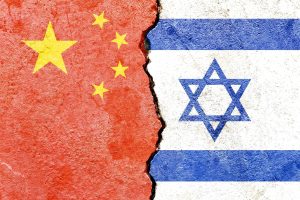At dawn on September 7, Hamas launched thousands of rockets toward Israel and sent armed gunmen across the border from the Gaza Strip. Israel is still dislodging the militants, but has reported finding over 900 dead so far; another 130 people have been taken captive by the Palestinian militant group, which is threatening to execute them.
Israel’s response was ferocious, with unprecedented bombings of Gaza and a formal declaration of war. Over 670 Palestinians have been killed in Israel’s counter-attack, and many more deaths could follow as Israel prepares for a ground assault. Israeli Defense Minister Yoav Gallant also called for a full siege of the territory, saying that “no electricity, no food, no fuel” would be allowed to enter Gaza.
How has China responded to the ongoing violence?
China’s initial statement came in the form of a Foreign Ministry press release on October 8, which said that “China is deeply concerned over the current escalation of tensions and violence between Palestine and Israel. We call on relevant parties to remain calm, exercise restraint and immediately end the hostilities to protect civilians and avoid further deterioration of the situation.” The statement was notable for its blandness; the Foreign Ministry refrained from specifically criticizing either Hamas or Israel. Calls to “protect civilians” could plausibly be aimed at either Israel’s ongoing counter-attacks, which are taking a heavy toll on the civilian population in Gaza, or at Hamas, which continues to hold Israeli civilians – including children and the elderly – hostage.
Chinese Foreign Ministry spokesperson Mao Ning expanded on that in her press conference on October 9 (incidentally, the first regular press conference since China went on national holiday for the Mid-Autumn Festival and National Day). However, the basic outline of China’s position – a toothless call for “calm” and “restraint” and a stubborn refusal to ascribe blame – did not change. Mao said China was “deeply saddened by the civilian casualties and oppose and condemn acts that harm civilians,” without specifying what those “acts” were. She also expressed China’s opposition to “moves that escalate the conflict and destabilize the region.”
Instead, China seems to be adopting the long view, urging a return to peace talks and implementation of the two-state solution “to end the cycle of conflict between Palestine and Israel.” As part of that, Mao raised one of China’s favorite new catchphrases, insisting that “each party’s legitimate concerns” be respected.
In gauging China’s response, it may be useful to compare it to statements from United Nations Secretary General Antonio Guterres. Guterres said he was “deeply distressed” over Israel’s plan to blockade the entire population of Gaza, warning that the “humanitarian situation in Gaza was extremely dire before these hostilities.” However, he also issued clear condemnation of the Hamas attack that preceded Israel’s response.
“I recognize the legitimate grievances of the Palestinian people. But nothing can justify these acts of terror and the killing, maiming and abduction of civilians,” Guterres said.
Guterres’ comments show that is possible to avoid taking sides while actually criticizing both parties for their violations of international law. That is not what China is doing.
China has entirely avoided condemning Hamas’ brutal initial assault on civilians, and even refused to label them “terrorist attacks” when prompted by a reporter from Brazil’s O Globo. There’s an especially deep irony in that, as China itself has been apoplectic in the past when Western governments refused to label certain attacks by Uyghur groups as terrorism.
What we are seeing here is China attempting to remain entirely neutral, but being seen as taking Hamas’ side as a result. Certainly in Israel, China’s calls for a ceasefire while refusing to condemn Hamas’ assault on Israeli civilians is interpreted as an attempt to shield the Palestinian militants from any consequences.
Earlier this year, fresh off its success in bringing Iran and Saudi Arabia to a breakthrough, China began to set itself up as a potential mediator in the Israel-Palestine conflict. A big part of that effort has been leaning more into China’s traditional support for Palestine against stepped-up Israeli oppression. In June, China hosted Palestinian President Mahmoud Abbas in Beijing. During the visit, China and Palestine signed a “strategic partnership,” pledging increased cooperation and funding to the Palestinian Authority.
China’s support for Palestine is one of the most effective cards it can play in attempting to bolster its standing in the Arab world versus the United States. In the current crisis, that geopolitical ploy is forcing China to avoid any direct criticism of Hamas. It’s especially ironic, as on the face of it China and Israel have much in common: both are high-tech security states that focus immense energy and resources on policing and oppressing a Muslim population seen as a security threat.
Yet geopolitics makes for strange bedfellows. With Israel a rock-solid U.S. ally, China sees little benefit to be had from taking Israel’s side on the current conflict. Beijing’s interests are better served seeking advantage as a champion of the Palestinian cause.
































